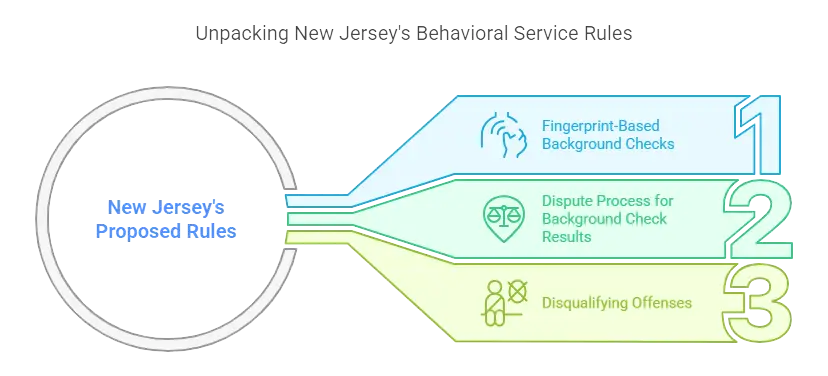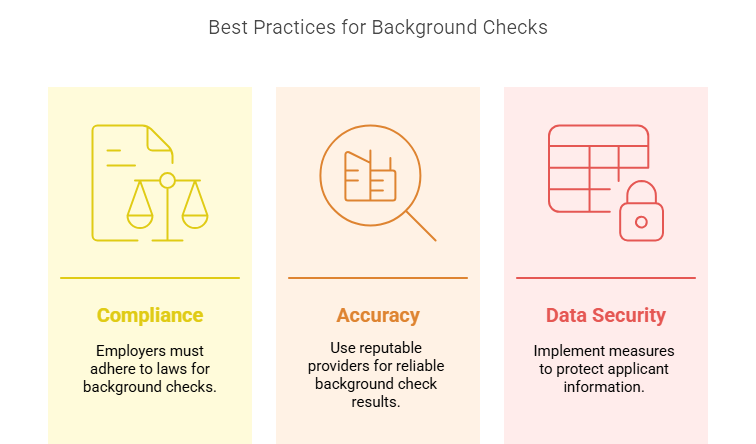Background checks have long been an essential part of the hiring process for New Jersey employers. These checks help ensure that candidates meet the qualifications and maintain the safety and integrity of workplaces. As we look toward 2025, several significant changes to New Jersey's background check laws are set to reshape the business landscape. This article explores these upcoming changes and their implications, giving employers the insights needed to stay compliant and make informed hiring decisions involving the New Jersey Employment Background Check.
Expanded Background Check Requirements for Healthcare Professionals
Overview of Senate Bill 2311 (S-2311)
Senate Bill 2311 (S-2311), which took effect on September 12, 2024, introduces new requirements for background checks in the healthcare sector. By expanding the scope of background checks, this bill aims to enhance the safety and trustworthiness of professionals working with vulnerable populations. It specifically targets professionals such as Applied Behavior Analysts, Creative Arts and Activities Therapists, Dieticians, and Nutritionists.
As an HR practitioner, I recognize that the integrity and safety of our workforce start well before the first day of employmentâÂÂit begins with diligence. I have witnessed personally how background screening, when appropriately implemented, safeguards not only the organization, but vulnerable populations that we serveâÂÂand particularly in healthcare and behavioral services. As New Jersey embraces and enacts its new and impending legislation, the role of our function becomes all the more critical. Reforms are more than compliance box-ticking; they are an articulation of our responsibility to ensure trust, transparency, and fairness in each and every one of our hires. Getting ahead is not only protecting our organizations and ourselves within the lawâÂÂbut doing right by the people we bring into our organizations.
Key Provisions
Under S-2311, the background check requirements have been significantly broadened. Professionals in the affected fields must now undergo both FBI fingerprinting and state criminal history checks. The law stipulates that any disqualifying information discovered during these checks can lead to license denial, revocation, or non-renewal.
Implications for Healthcare Employers
Healthcare employers must adjust their hiring processes to comply with these new regulations. It is essential to update hiring policies to include enhanced background checks and ensure that all documentation is properly maintained. Employers should also prepare for potential hiring delays due to the extended processing times for fingerprint-based checks. Staying ahead of these requirements will help healthcare organizations maintain compliance and ensure a safe work environment.
New Background Check Requirements for NJ Transit Employees
Overview of Assembly Bill 759
Assembly Bill 759 aims to tighten background check protocols for employees working in security-sensitive roles within NJ Transit. Although this bill has been introduced, it has not yet been enacted. Should it pass, the new law would likely take effect in 2025, mandating stricter background checks for transit employees.
Key Provisions
The bill requires background checks for all NJ Transit employees who work in "security-sensitive areas." This includes mandatory fingerprinting and adherence to both state and federal regulations. The bill also provides a 20-day appeal process for disqualified employees based on their background checks, allowing them a window to contest findings.
Implications for NJ Transit
To prepare for the potential enactment of Assembly Bill 759, NJ Transit should begin developing procedures that align with the billâÂÂs requirements. This includes establishing a system for conducting fingerprint-based background checks and creating a clear process for handling appeals. By doing so, NJ Transit can ensure a smooth transition if the bill becomes law.
Expanded Rules for Behavioral Assistance Services Providers
Overview of the New Jersey Department of Human Services Proposed Rules
The New Jersey Department of Human Services has proposed new rules that would expand background check requirements for those providing behavioral assistance services. Expected to be implemented in 2025, these rules focus on ensuring that providers working with vulnerable populations undergo thorough background screenings.
Key Provisions
The proposed rules introduce fingerprint-based background checks as a standard for behavioral assistance service providers. They also outline a process for disputing inaccuracies in background check results. Additionally, the rules specify certain disqualifying offenses that would render an applicant ineligible for employment in this field.
Implications for Behavioral Assistance Services Providers
Behavioral assistance service providers should review these proposed rules carefully and update their hiring procedures. Understanding the expanded requirements will be crucial for compliance, and providers may need to implement more rigorous screening protocols to ensure they meet the new standards.

Ongoing "Ban the Box" Requirements
Overview of the Opportunity to Compete Act
The Opportunity to Compete Act, also known as the "Ban the Box" law, continues to impact how New Jersey employers conduct background checks. This law applies to employers with 15 or more employees and restricts them from asking about a candidate's criminal history before the first interview. It aims to provide fairer opportunities for individuals with prior convictions to secure employment.
Key Considerations for Employers
Employers must adjust their job applications and interview protocols to comply with the "Ban the Box" requirements. It is crucial to avoid questions about criminal history before the first interview, which can be integrated into the hiring process later once an initial evaluation of the candidate's qualifications has been made.
Best Practices for Conducting Background Checks in New Jersey
Compliance with Federal and State Laws
New Jersey employers must balance state regulations with federal requirements, such as the Fair Credit Reporting Act (FCRA). The FCRA requires employers to obtain written consent from applicants before conducting background checks and to follow specific procedures if a background check leads to a decision not to hire. Ensuring compliance with federal and state laws helps protect employers from legal risks.
Accuracy and Fairness
Employers should work with reputable background check providers to ensure accurate results. ItâÂÂs important to verify the information provided in reports and to allow applicants to explain any discrepancies. This approach helps maintain fairness and transparency throughout the hiring process.
Data Security and Privacy
Protecting sensitive applicant information is critical. Employers should implement robust data security measures to prevent unauthorized access to background check data. This ensures compliance with legal standards and builds trust with potential employees.

Conclusion
As New Jersey's employment background check laws evolve in 2025, employers face new requirements and responsibilities. Staying informed and compliant with these changes is essential for maintaining a safe and legally sound workplace. Understanding the implications of Senate Bill 2311, Assembly Bill 759, the proposed rules for behavioral assistance providers, and ongoing "Ban the Box" requirements will help employers navigate this shifting landscape.
For employers needing guidance on navigating New JerseyâÂÂs changing background check regulations, contacting legal counsel or a professional background check service like GCheck⢠can provide the necessary support. Compliance with these new laws ensures a smoother hiring process and builds a safer, more qualified workforce. Contact us today to learn how we can assist with your background check needs.

GCheck Editorial Team
Meet the GCheck Editorial Team, your trusted source for insightful and up-to-date information in the world of employment background checks. Committed to delivering the latest trends, best practices, and industry insights, our team is dedicated to keeping you informed.
With a passion for ensuring accuracy, compliance, and efficiency in background screening, we are your go-to experts in the field. Stay tuned for our comprehensive articles, guides, and analysis, designed to empower businesses and individuals with the knowledge they need to make informed decisions.
At GCheck, we're here to guide you through the complexities of background checks, every step of the way.







